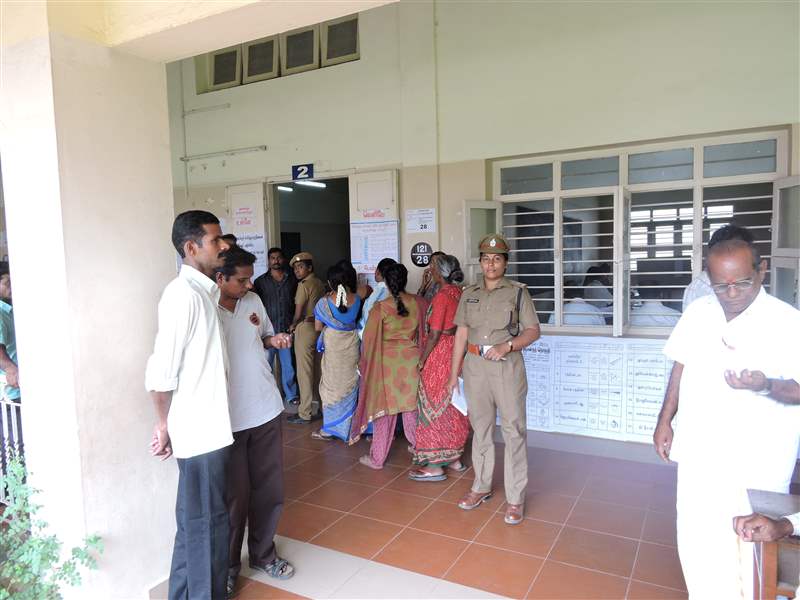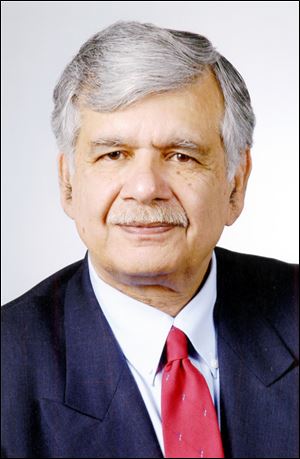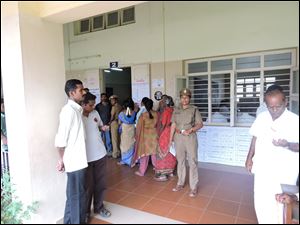
COMMENTARY
Balloting continues peacefully in India
4/27/2014
A police officer stands by as voters enter a polling station in Coimbatore to cast their ballots in India’s parliamentary elections. About 950 million eligible voters will decide 543 seats.
SPECIAL TO THE BLADE/S. AMJAD HUSSAIN
Buy This Image

Hussain
COIMBATORE, India — After a weeklong train journey through the western desert state of Rajasthan, I have now come to south India.
The contrast between Rajasthan and Tamil Nadu became obvious when I landed at the airport here. The bold bright and vivid saris and ankle-length skirts that women wear in Rajasthan gave way to slightly subdued but still colorful shalwar-kameez and saris. Also not seen here are the exuberant turbans and luxuriant moustaches that are so much part of Rajasthan.
With 1 million people, Coimbatore is the second largest city after Chennai — formerly Madras. Once called the Manchester of South India because of its flourishing textile industry, it is now the hub of information technology, education, health care, and manufacturing in Tamil Nadu state.
India is undergoing parliamentary elections. It is the world’s biggest election with 950 million eligible voters. Starting on April 7 and continuing through May 12, the elections will decide 543 seats in the lower house of parliament, commonly called Lok Sabha in Hindi. The winning party will form the next government.
Government offices, schools, and bazaars are closed so government servants, students, and others can return to their hometowns and villages to vote.

A police officer stands by as voters enter a polling station in Coimbatore to cast their ballots in India’s parliamentary elections. About 950 million eligible voters will decide 543 seats.
In Coimbatore, the lines started early in the day at the polling station close to my hotel. No electioneering is permitted near the polling stations. Also absent were campaign flyers and signs in the vicinity of polling. A token presence of police at the polling stations ensures that the process runs smoothly.
Just as in the United States, a picture ID is required for casting the ballot. Once the identity of a person is verified by matching his/her name with an ID card, a ballot is issued. That allows the person to go into the polling room and cast the vote. Every voter then has a line drawn on the nail of the index finger with indelible ink.
It is the Indian version of the stickers and pins “ I Voted” that people sport in the United States after voting. Finger stains also help prevent double voting.
Earlier I had seen the same process while traveling through Rajasthan. There the lines were sparse but very colorful because of the clothes people wear in that region. In Jaisalmar, the city at the edge of Thar Desert, many voters rode camels to the polling stations.
It is widely expected that Bharatiya Janata Party will sweep the elections and Narendra Modi, the current leader of the party, will be poised to become the next prime minister. His candidacy, however, is marred with controversy.
As chief minister of Gujarat State he was credited in making his state a magnet for domestic and foreign investment. He would have had a great record had it not been for an incident in 2002 in which a thousand people, mostly Muslims, were killed in one of the worst acts of communal violence. A committee appointed by the supreme court had cleared him of direct complicity.

However, there is ample evidence that the police were complicit in providing Hindu extremists the lists of Muslim homes.
Because of that reason, the United States and other western governments had shunned Mr. Modi, and the United States had denied him a visitor visa. But because of the unfolding political realities in India, the United States and European countries have warmed up to him.
The Congress Party dominated by the Nehru scion is expected to lose in these elections. And that puts Indian Muslims — who number upward of 133 million — in a strange and difficult predicament. A majority of them always have voted for the Congress. And a majority of them still blame Mr. Modi for the Gujarat pogrom 12 years ago.
On his part Mr. Modi has been wooing the Muslim vote with the promise of economic prosperity for all. Young Muslims, more in tune with economic realities than their parents, are inclined to give him the benefit of the doubt.
Dr. S. Amjad Hussain is a retired Toledo surgeon and a member of the University of Toledo Board of Trustees whose column appears in The Blade. He is in Coimbatore to represent the university at the annual commencement of PSG Institute of Management that awards UT degrees to its graduates.
Contact him at: aghaji@bex.net.